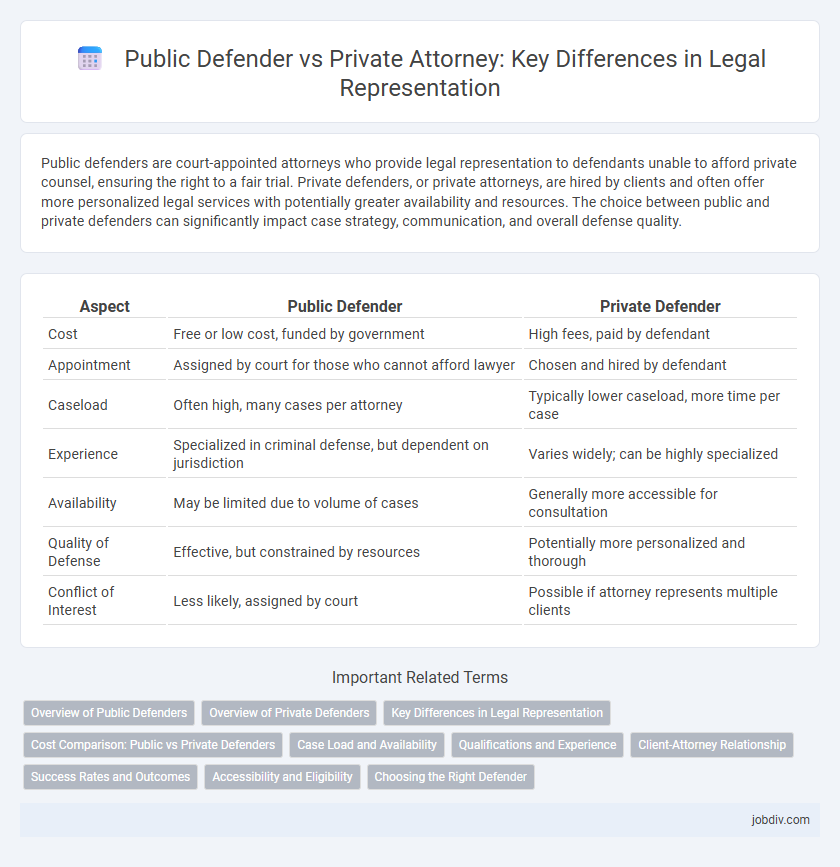Public defenders are court-appointed attorneys who provide legal representation to defendants unable to afford private counsel, ensuring the right to a fair trial. Private defenders, or private attorneys, are hired by clients and often offer more personalized legal services with potentially greater availability and resources. The choice between public and private defenders can significantly impact case strategy, communication, and overall defense quality.
Table of Comparison
| Aspect | Public Defender | Private Defender |
|---|---|---|
| Cost | Free or low cost, funded by government | High fees, paid by defendant |
| Appointment | Assigned by court for those who cannot afford lawyer | Chosen and hired by defendant |
| Caseload | Often high, many cases per attorney | Typically lower caseload, more time per case |
| Experience | Specialized in criminal defense, but dependent on jurisdiction | Varies widely; can be highly specialized |
| Availability | May be limited due to volume of cases | Generally more accessible for consultation |
| Quality of Defense | Effective, but constrained by resources | Potentially more personalized and thorough |
| Conflict of Interest | Less likely, assigned by court | Possible if attorney represents multiple clients |
Overview of Public Defenders
Public defenders are government-appointed attorneys who provide legal representation to individuals who cannot afford private counsel, ensuring the right to a fair trial under the Sixth Amendment. They handle a high volume of cases, often in criminal matters, with comprehensive knowledge of local courts and legal procedures. Despite resource limitations, public defenders are trained to provide effective legal defense, maintaining a vital role in the justice system.
Overview of Private Defenders
Private defenders are attorneys hired directly by defendants to provide legal representation, often offering more personalized attention compared to public defenders assigned by the court. They typically have greater resources and time to dedicate to each case, potentially enhancing the quality of defense in complex legal matters. Many private defenders specialize in specific areas of law, allowing for tailored defense strategies that align closely with their clients' needs.
Key Differences in Legal Representation
Public defenders are appointed by the court to represent defendants who cannot afford private attorneys, often managing high caseloads that may impact the time dedicated to each case. Private defenders are hired by clients, allowing for potentially more personalized attention and resources but at a significant financial cost. The key differences in legal representation include case load, resource availability, and client-attorney relationships, which critically affect defense strategies and outcomes.
Cost Comparison: Public vs Private Defenders
Public defenders provide legal representation at no cost to defendants who cannot afford private counsel, funded by government resources. Private defenders charge fees that vary widely based on case complexity, geographic location, and attorney experience, often resulting in higher immediate expenses for clients. The cost difference significantly impacts access to legal services, with public defenders offering essential support for low-income individuals while private defenders may provide more personalized attention at a greater financial outlay.
Case Load and Availability
Public defenders manage significantly higher case loads, often representing hundreds of clients simultaneously, which can limit the time dedicated to each case and impact availability for detailed legal defense. Private defenders typically handle fewer cases, allowing for more personalized attention and greater availability to meet client needs and prepare thorough legal strategies. The disparity in case load directly influences the quality of representation and accessibility to legal resources in criminal defense cases.
Qualifications and Experience
Public defenders typically possess extensive courtroom experience and receive specialized training in criminal defense but often manage high caseloads that can limit individual attention. Private defenders usually have the flexibility to devote more time per case and may bring varied expertise depending on their practice areas and years in law. Both must hold valid law licenses, but private attorneys often showcase diverse qualifications through additional certifications or specific trial histories.
Client-Attorney Relationship
The client-attorney relationship in public defender cases often involves high caseloads, which can limit personalized attention and communication. Private defenders typically offer more individualized services, fostering stronger trust and collaboration between client and attorney. Effective communication and dedicated time allocation are critical factors distinguishing the client-attorney dynamic in these two defense settings.
Success Rates and Outcomes
Public defenders often handle a higher volume of cases with limited resources, which can impact their success rates compared to private defenders who typically have more time and resources per client. Studies indicate private defenders achieve better outcomes in plea negotiations and trial verdicts, partly due to personalized attention and access to expert witnesses. However, the effectiveness of representation also depends on case complexity, jurisdiction, and individual attorney skill rather than solely on public versus private status.
Accessibility and Eligibility
Public defenders provide legal representation to individuals who cannot afford private attorneys, ensuring access to justice regardless of financial status. Eligibility for public defenders is typically based on income level and means testing, which varies by jurisdiction but aims to assist low-income defendants. Private defenders offer broader accessibility without income restrictions, but high costs can limit affordability for many seeking legal defense.
Choosing the Right Defender
Choosing the right defender depends on factors such as case complexity, financial resources, and the defendant's rights. Public defenders offer experienced representation at no cost but may have higher caseloads, affecting available time per client. Private defenders provide personalized attention and potentially quicker case handling but involve significant fees, making them suitable for those who can afford specialized legal counsel.
Public Defender vs Private Defender Infographic

 jobdiv.com
jobdiv.com